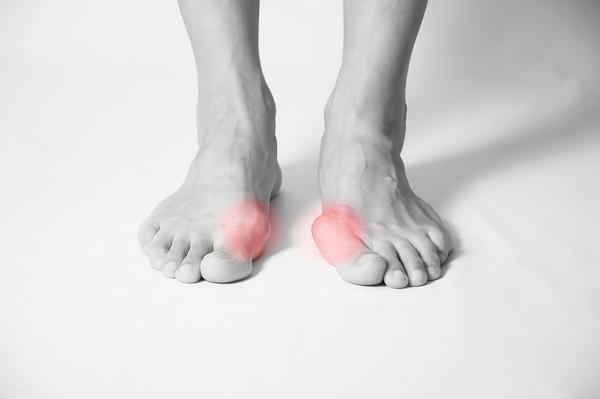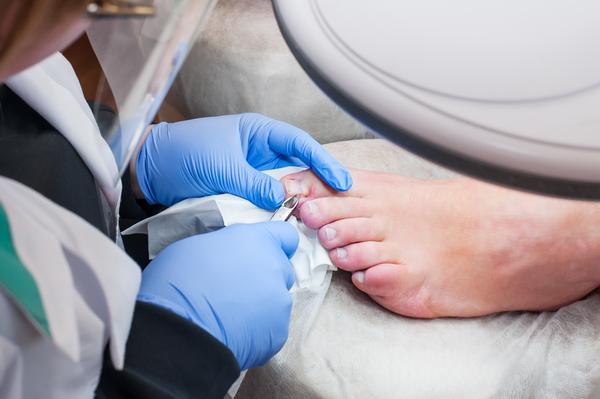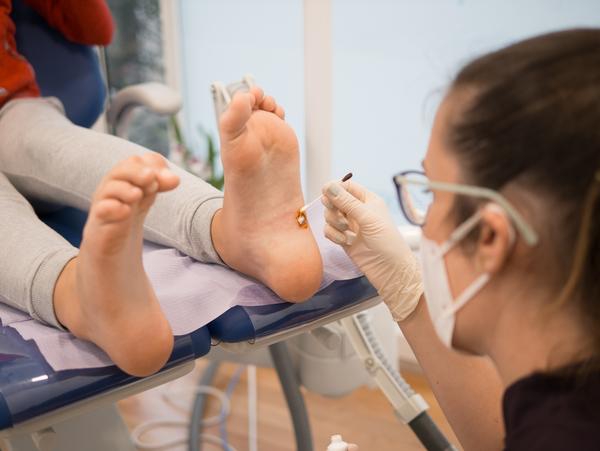Our Vancouver Podiatrists Treat a Range of Ankle, Foot, and Nail Conditions
Is foot or ankle pain keeping you from enjoying certain activities? Are you struggling with an ingrown toenail or a foot wound that simply won’t heal? It's time to find relief at Clover Podiatry. Our skilled foot doctors customize treatment plans to address your specific needs to ensure you receive the best care possible. Count on us to accurately diagnose and treat your foot, ankle, and nail conditions so you can return to a pain-free and active lifestyle.
Foot Conditions We Treat With Comprehensive Care
Our medical team understands how frustrating it can be to know something’s wrong, but not know what it is. We strive to provide you with the education and detailed information you need to make the right decisions for your foot health. Here are some of the conditions we frequently assess and treat.
Wound Care
Tek Fish, DPM is the founder of Clover Podiatry and specializes in wound treatment. Our entire team provides comprehensive care to help diagnose various types of leg, foot, and ankle wounds and administer prompt treatment to prevent further complications. Some of the conditions we treat include, but aren’t limited to:
- Arterial ulcers. If you suffer from poor circulation or high blood pressure, you might discover these wounds between your toes or on the outside of your leg.
- Diabetic foot ulcers. These are caused by neuropathy and other complications of this disease and usually form on the heels and other high-impact areas of your feet.
- Venous ulcers. These wounds often develop just above the ankle as a result of pregnancy, a history of blood clots, varicose veins, or obesity.
We offer various treatment approaches for wounds, such as:
- Debridement. This procedure removes dead tissue.
- Advanced wound dressings. These help protect the area and promote healing.
- Medication. If necessary, we may prescribe antibiotics to ward off infection.
Athletic Injuries
- Achilles tendinitis. The Achilles tendon is the band of tissue connecting the calf muscles to the heel bone. When this area experiences repetitive stress, you might develop tendinitis, especially if you’re an avid runner or engage in other activities that involve extensive movement, such as jumping. Treatment approaches we frequently recommend include rest, icing, anti-inflammatory medications, physical therapy, and sometimes orthotic devices to relieve strain on the tendon.
- Ankle sprains. Ankle sprains occur when the ligaments supporting the ankle are stretched or torn, usually due to a sudden twist or turn of the foot. If a minor stress injury happens suddenly, you may be advised to follow the RICE method—rest, ice, compression, elevation—followed by gentle movement, medication, and then physical therapy to restore strength and flexibility. However, in severe cases, we might recommend surgery to repair torn or ruptured ligaments.
Plantar Fasciitis
One of the most common causes of heel pain is plantar fasciitis. Estimates indicate there are approximately 3 million cases annually. This condition involves inflammation of the plantar fascia, a thick band of tissue running across the bottom of the foot and connecting the heel bone to the toes. Plantar fasciitis typically causes stabbing pain that is most severe with the first steps in the morning.
Some people may initially find relief with home remedies such as anti-inflammatory medication and stretching exercises. However, if the condition doesn’t heal in a couple of months, our professional recommendations often include orthotic devices, physical therapy, and, in severe cases, corticosteroid injections or surgery.
Ingrown Toenails
Symptoms of an ingrown toenail include a nail growing into the base of a toe, also known as the nail fold, or skin covering a toenail. At Clover Podiatry, our skilled team uses various methods to alleviate pain and prevent the recurrence of ingrown toenails, such as:
- Partial nail removal. This allows for proper regrowth and helps to eliminate discomfort.
- Total nail removal. In severe cases, the entire nail may be removed to prevent future issues.
Plantar Warts
 Warts on your feet are most commonly plantar warts, which are caused by specific strains of the human papillomavirus. These growths form in the skin's outer layer, resulting in hard, grainy, or fleshy bumps. Children are especially prone to plantar warts, but people of all ages can develop them. Without professional treatment to kill the virus that causes them, plantar warts can persist for years.
Warts on your feet are most commonly plantar warts, which are caused by specific strains of the human papillomavirus. These growths form in the skin's outer layer, resulting in hard, grainy, or fleshy bumps. Children are especially prone to plantar warts, but people of all ages can develop them. Without professional treatment to kill the virus that causes them, plantar warts can persist for years.
At our Vancouver office, we often rely on Swift therapy to treat plantar warts. This innovative treatment uses targeted microwave energy to stimulate your body’s natural immune cycle to stop the virus and kill the wart. Here are the benefits of Swift therapy:
- Non-invasive. It’s a quick and painless procedure that doesn’t require anesthesia.
- Effective. Swift therapy boasts a high success rate—more than 80 percent—with minimal side effects.
- Convenient. Most people only need one treatment, but overall, you’ll require no more than three.
Knowing When to See a Podiatrist for Your Foot Condition
While self-care methods often soothe painful problems, sometimes the issue lingers or worsens. That's when it’s time to schedule an appointment with our Vancouver foot doctors.
Here are some signs to watch out for:
- Difficulty walking. If pain makes it hard to move around, stand, or do daily activities, don’t wait. Seek a professional evaluation and treatment immediately to prevent further complications.
- Inflammation. Do you notice swelling, redness, or warmth in your foot or ankle? While inflammation is your body’s natural healing response, these symptoms could indicate more chronic inflammation, an infection, or an injury that needs prompt medical attention.
- Visible deformities. Any bumps, lumps, or changes in the shape of your foot or ankle should be checked out. Our podiatrists will conduct a thorough examination using X-rays and other diagnostic methods to determine the cause and recommend the best course of treatment.
- Unusual sensations. Persistent numbness, tingling, or loss of feeling in your foot or ankle could be an indication of peripheral neuropathy, a form of nerve damage that affects your legs and feet. A prompt medical assessment is crucial.
- Difficulty fitting into shoes. If pain, swelling, or deformities present a challenge, we’ll provide helpful guidance on proper footwear and address any underlying issues.
When you trust Clover Podiatry with your ankle, foot, and nail conditions, our attentive approach, combined with our quality care, will get you back on your feet in no time so you can enjoy the quality of life you deserve.






